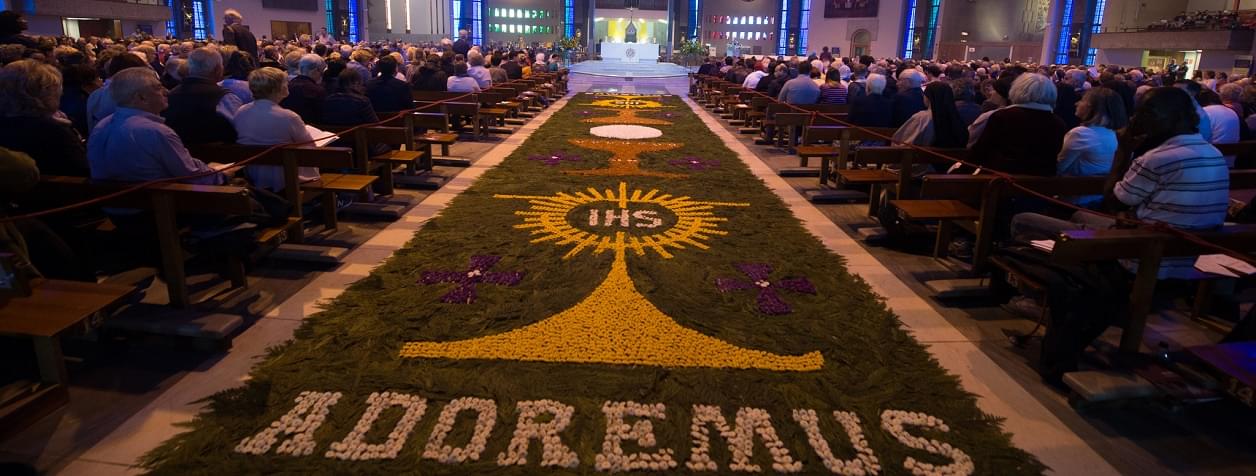By Dr Philip McCarthy, Chief Executive, Caritas Social Action Network

and as the night wore on I witnessed their commitment to alleviating hunger and loneliness. I realised that this was an integral part of their Christian faith.
In my adolescent mind I had assumed that being a Catholic meant going to Church and trying not to commit sins, so this was a breakthrough for me! Pope Benedict XVI tells us in Deus Caritas Est,
‘The Church’s deepest nature is expressed in her three-fold responsibility: of proclaiming the word of God, celebrating the sacraments, and exercising the ministry of charity (caritas). These duties presuppose each other and are inseparable. For the Church, charity is not a kind of welfare activity which could equally well be left to others, but is a part of her nature.’
If proclaiming the word, celebrating the sacraments and caritas are inseparable, it follows that the Eucharist, the ‘source and summit’ of our Christian lives, must make demands on the way we relate to others, particularly those in poverty and
exclusion from society. Like manna in the desert, the Eucharist sustains us in difficult times and helps us to deal with our limitations. St Pope John Paul II wrote: ‘Were we to disregard the Eucharist, how could we overcome our own deficiency?”
We go to church to receive the gift of the Eucharist, but from the moment we enter the building we are reminded of the demands of social justice. We know that Jesus caused scandal to the religious authorities of his own time by sharing meals with outcasts – but how well do we welcome outsiders and those who do not easily ‘fit in’ to the Eucharistic
feast? I expect that most of us can think of times when we have failed in this and so we start Mass by admitting our own failures and brokenness.
Throughout the Mass there may be words and actions that remind us that the Eucharist calls us to serve each other, as Jesus did at the Last Supper by washing the feet of his disciples. We may also reflect that such love and service can be costly and as we call to mind Jesus’ sacrifice for us, we may reflect on the sacrifices that many have made in His Name for social justice. The Blessed Oscar Romero, one of the patrons of Caritas, gunned down while saying Mass, is a vivid example, but we may also be called to make day to day sacrifices of our time and energy for others.
At the end of the Mass, having met Jesus in the Eucharist, we are sent forth, not just to gossip on the church steps, but to change the world and build the Kingdom of God. We have received the body of Christ and now we leave to be the body of Christ for our world; to bring healing and wholeness to a divided and unjust world. As St Teresa of Avilla wrote:
‘Christ has no body now but yours. No hands, no feet on earth but yours. Yours are the eyes through which he
looks compassion on this world. Yours are the feet with which he walks to do good. Yours are the hands through which he blesses all the world. Yours are the hands, yours are the feet, yours are the eyes, you are his body. Christ has no body now on earth but yours.”
I have described some of the demands that the Eucharist makes on the way we live our lives, but how does it change the way we see the world? It seems to me that this is where Eucharistic adoration can help us. Through Eucharistic adoration
we may be led into contemplation of wholeness, the unity of the human family and the wonder of the universe. In Laudato Si’ Pope Francis wrote:
‘In the Eucharist, fullness is already achieved; it is the living centre of the universe, the overflowing core of love and of inexhaustible life. Joined to the incarnate Son, present in the Eucharist, the whole cosmos gives thanks to God. Indeed, the Eucharist is itself an act of cosmic love. We are called to respond to this outpouring love for us, through acts of compassion for others and care
for our planet.’
A brief article can only touch on a few aspects of this subject. I hope the Adoremus Congress workshop will enable us to explore this subject in greater depth and lead to practical actions in service of others. If so, what a wonderful legacy
Adoremus might leave in England and Wales for the years to come.
This article was prepared for a workshop at the National Eucharistic Congress held in Liverpool on 8-9 September 2018, and was first published in ‘The Universe’.



You must be logged in to post a comment.